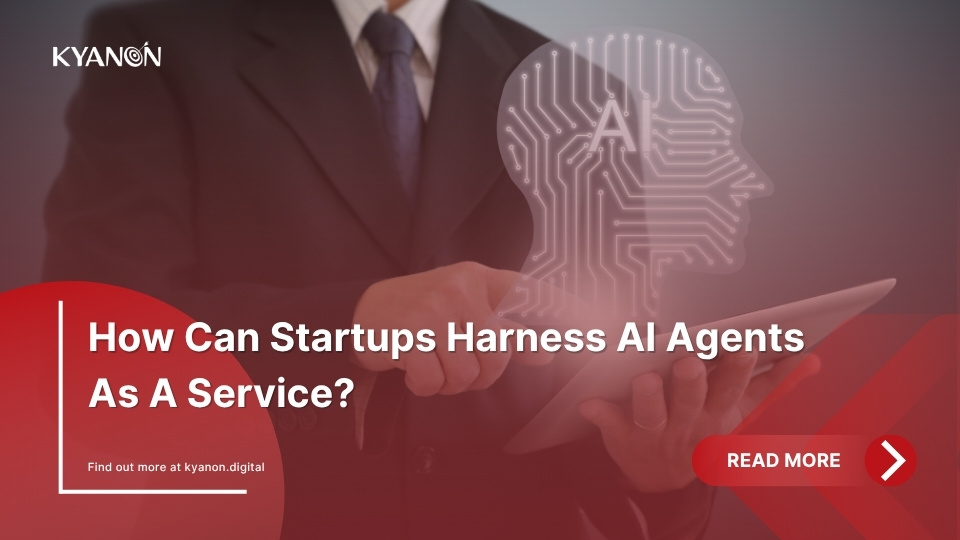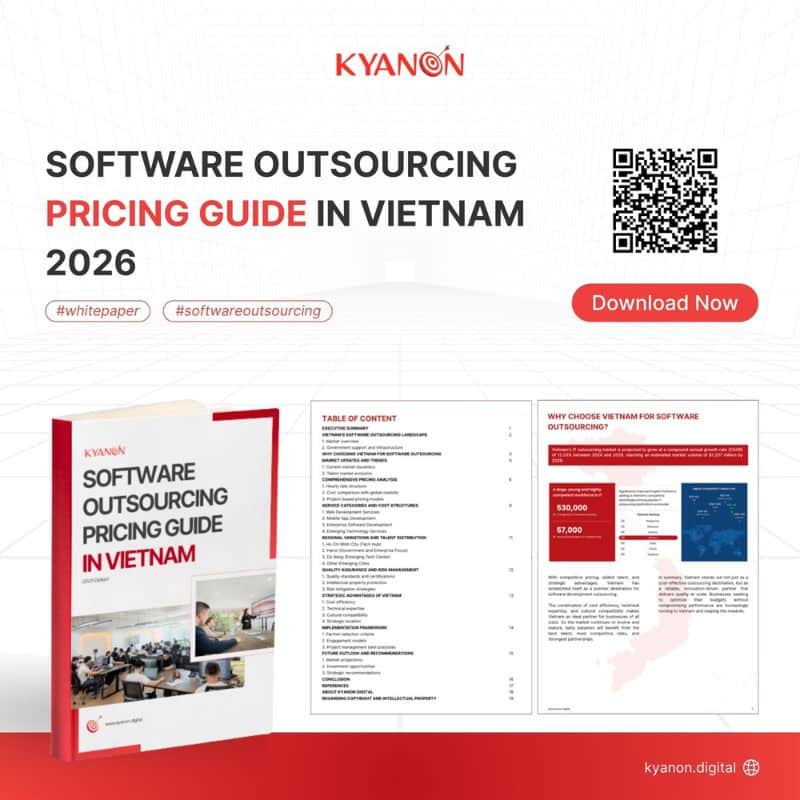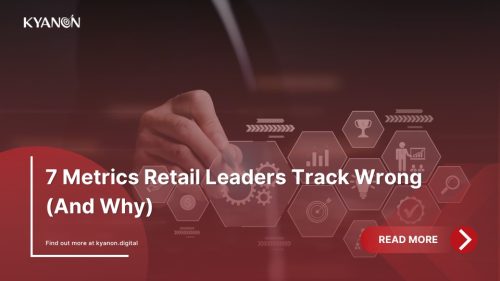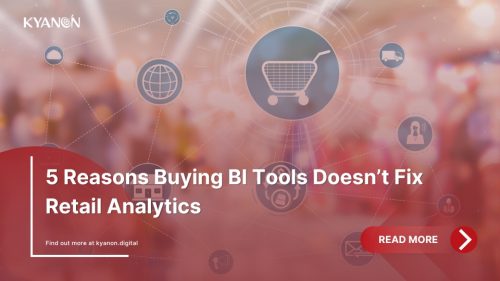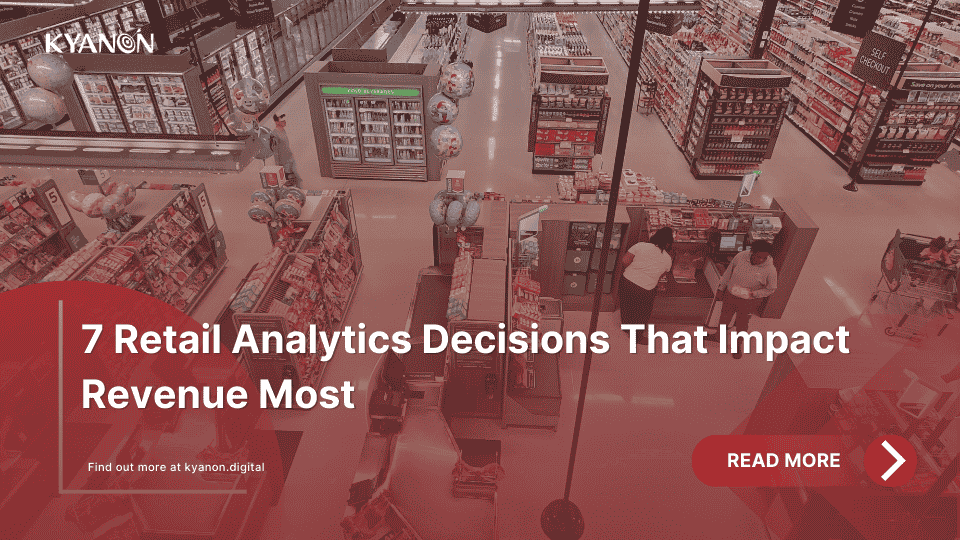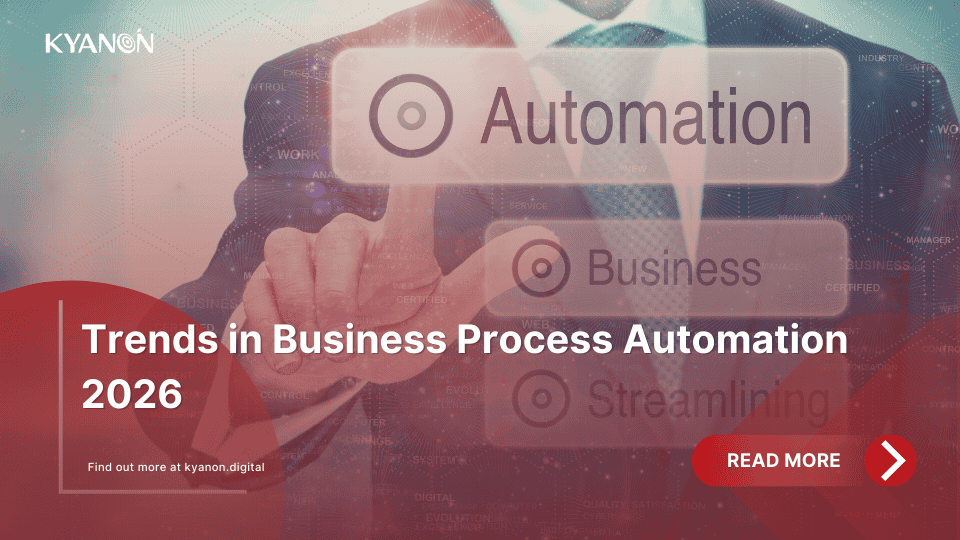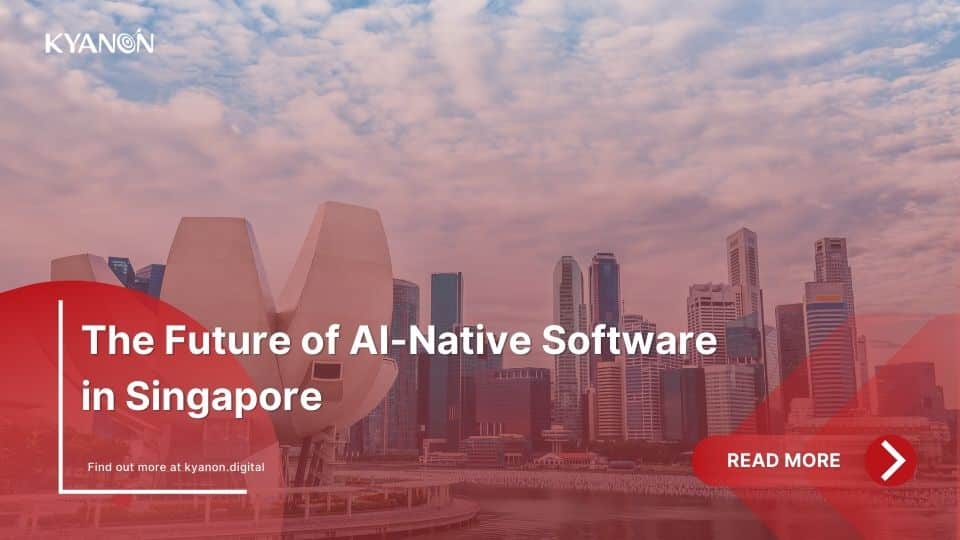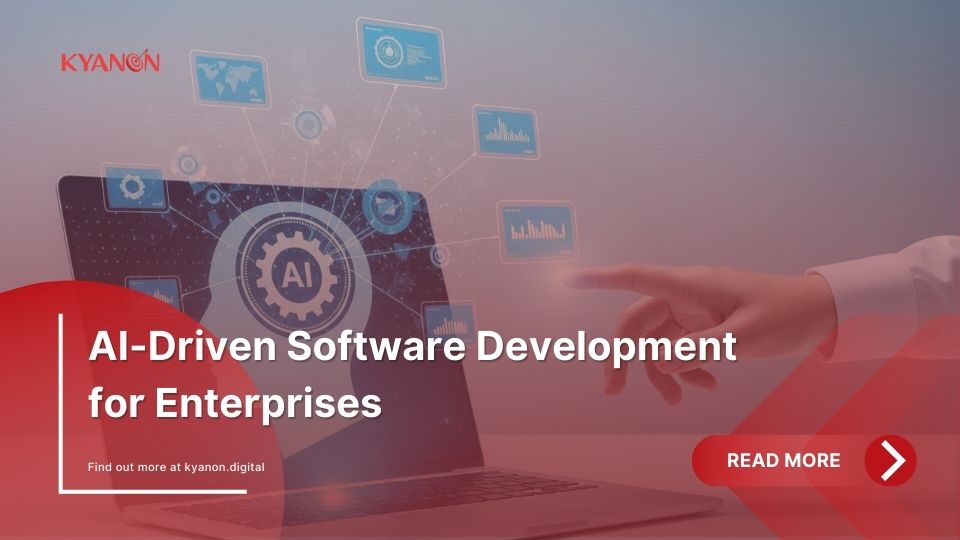AI agents as a service are rapidly becoming the go-to solution for startups grappling with high burn rates, overstretched teams, and relentless pressure to scale. In today’s volatile climate, AI startups are burning through $100 million in just three years, half the time it took a decade ago (SaaStr x SVB, 2024). The pressure to justify every hire and tool with fast ROI is intense, especially when massive compute costs hit from day one.
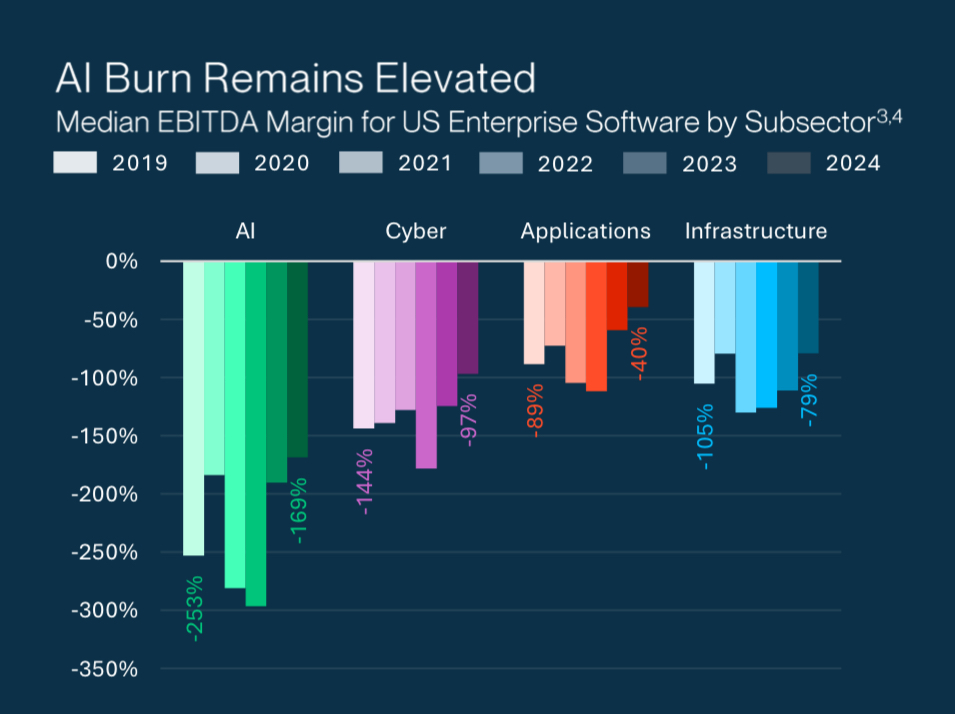
Sound familiar? Long hours, lean teams, and limited budgets, yet you’re still expected to scale fast, delight customers, and ship product at lightning speed.
This is where AI Agents step in. Acting like digital teammates, they automate routine tasks, optimize operations, and dramatically reduce burn, without growing headcount. In this blog, let Kyanon Digital break down how AI agents as a service work, why they’re tailor-made for startups, and how your business can tap into their full potential starting today.
Key takeaway
- Problem: Startups face limited resources, time constraints, and talent shortages when building AI solutions in-house.
- Solution: AI Agents as a Service (AI AaaS) offer pre-built, scalable AI capabilities without heavy upfront investment.
- Step: Identify business use cases, select the right AI AaaS provider, and integrate the agent into existing workflows.
- Outcome: Faster time-to-market, increased productivity, and competitive edge with lower development costs.
Further reading:
- Startup guide to AI as a Service (AIaaS): Fast-track your MVP with Scalable AI
- AI MVP development: How to build, launch, and iterate faster
- How to build your own AI model training services
1. Why does AI agents matter for startups?
In today’s startup landscape, where capital efficiency is everything, AI agents as a service are emerging as game-changers. Instead of bloated headcounts and in-house infrastructure, founders are turning to automation-first models to stay lean and move fast.
According to Battery Ventures, startups that implement AI automation can cut R&D and operational costs by up to 20%, while increasing valuation multiples by 24%. That shift from CapEx to OpEx, paying for outcomes, not overhead, is reshaping how smart startups grow.
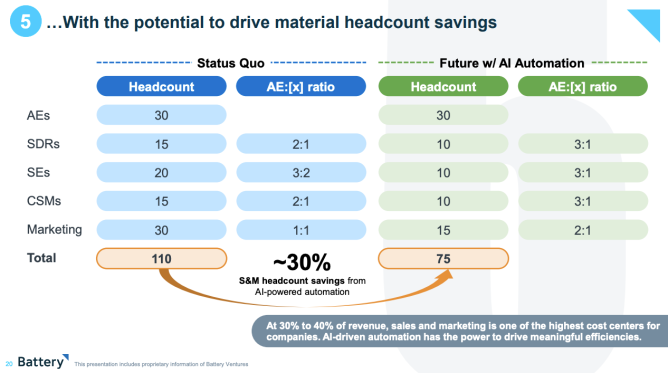
With access to AI agent development services, lean teams can deploy intelligent agents that handle support, data processing, and task management without hiring more staff. And by partnering with the right AI agent service provider, startups can scale workflows, enhance productivity, and reduce burn, all while staying agile.
The result? More output, less cost, and more room for startups to focus on what matters: building a product that wins the market.
Transform your ideas into reality with our services. Get started today!
Our team will contact you within 24 hours.
2. What are AI agents and how do they work?
In today’s race toward smarter, leaner operations, AI agents are redefining how modern businesses work, whether you’re streamlining proposal management, automating customer support, or enhancing data workflows. AI agents as a service deliver intelligent, scalable, and cost-effective solutions without increasing headcount.
2.1. What are AI agents?
An AI agent is an autonomous software entity, typically powered by large language models (LLMs) such as GPT-4 or Claude. Unlike traditional automation tools that follow fixed rules, AI agents can understand context, adapt their actions, and execute complex workflows without manual intervention. This makes them ideal for startups aiming to reduce overhead while boosting speed and agility.

By using AI agent development services, companies can deploy agents tailored to specific business functions, from automating proposal generation to managing customer support, expense approvals, or sales outreach.
Whether you’re a seed-stage startup or scaling to Series B, working with the right AI agent service provider means you can focus your human talent where it truly matters, innovation, not admin.
2.2. How do AI agents work?
AI agents combine several advanced technologies to deliver real-world impact:
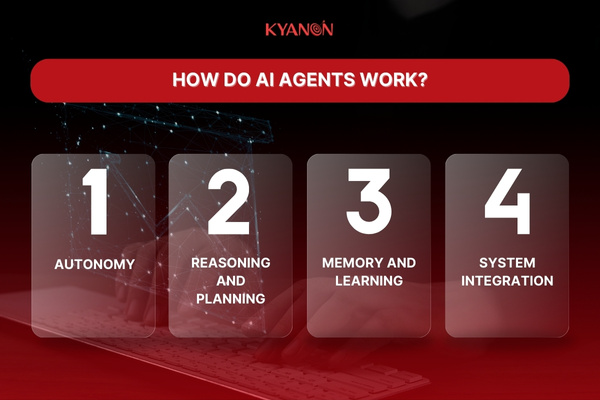
Autonomy
Once triggered, agents operate independently, reacting to changes in the environment or data inputs. For example, a support agent can respond to customer queries without human oversight.
In 2023, Klarna deployed an AI agent that now handles two-thirds of customer support chats across 23 markets. The agent autonomously understands context, retrieves data, and resolves issues in under 2 minutes, matching the performance of human agents.
Reasoning and planning
Using LLMs fine-tuned with planning frameworks like ReAct, Reflexion, or Auto-GPT, agents can break down complex tasks, evaluate actions, and optimize execution based on intent and outcome.
Memory and learning
By integrating with vector databases and retrieval-augmented generation (RAG) systems, agents can remember past interactions, refer back to relevant documents, and improve performance over time.
For example, BMW implemented a multi-agent system using agentic RAG on AWS. It features shared conversational memory stored in MongoDB, enabling agents to recall previous queries and collaborate across four domains: AWS documentation retrieval, infrastructure monitoring, cost optimization, and automated code deployment. As a result, agents maintain real-time context and deliver accurate, contextual assistance to engineering teams.
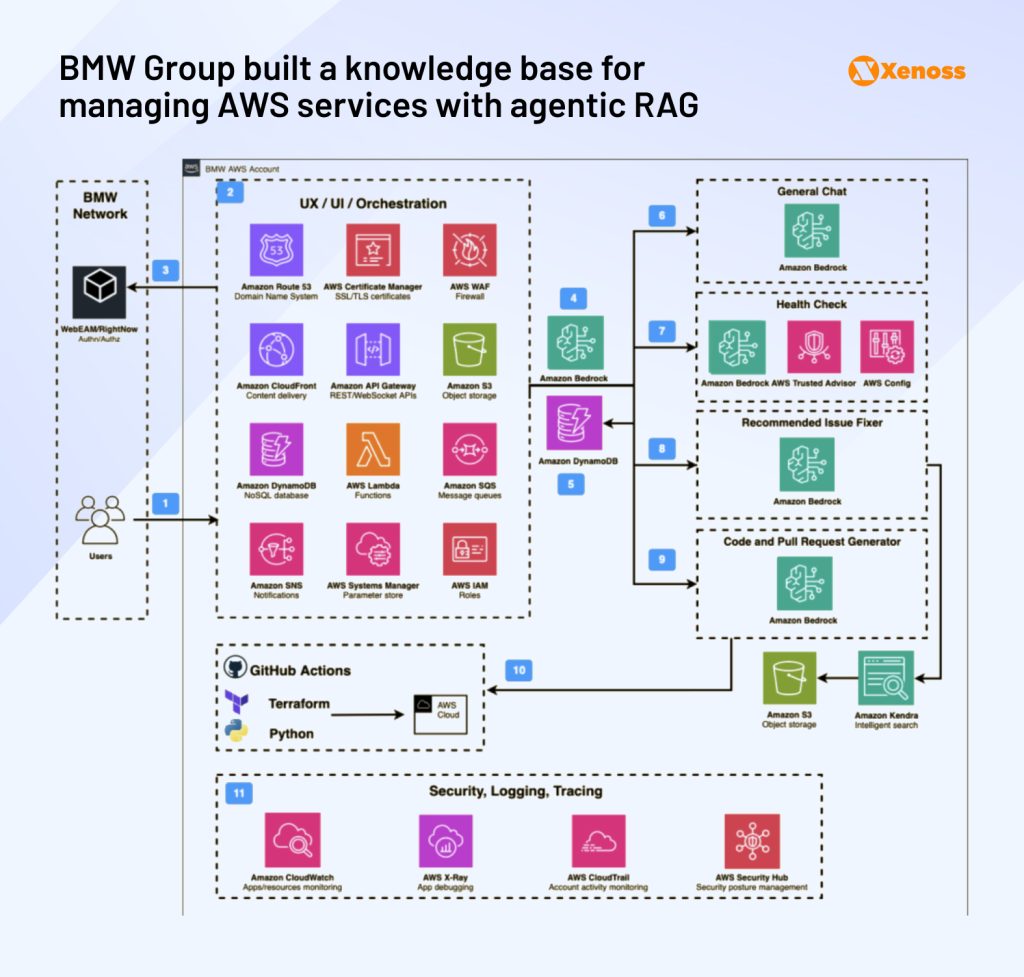
System integration
Agents don’t operate in silos. Through APIs and plugins, they connect with CRMs, ERPs, email systems, knowledge bases, and more, coordinating across multiple tools to complete multi-step workflows.
Case study for AI agent: A marketing team at a European SaaS startup used Auto-GPT, an open-source agent framework, to automate their SEO content strategy. The agent was given a high-level goal: “Improve Google rankings for our CRM software.”
Here’s how the AI agent applied reasoning and planning:
- Step 1: Research top-ranking keywords and competitor articles
- Step 2: Identify content gaps and prioritize article topics
- Step 3: Generate blog outlines and content drafts
- Step 4: Recommend publication schedules based on traffic data
All of this was done autonomously without daily human input, using ReAct-style planning to reason through multi-step decisions.
Result: Time spent on SEO planning dropped by 80%, and blog traffic increased by 30% in 6 weeks.
3. Key benefits of AI agents for startups
In a world where startups must move quickly with fewer resources, AI-as-a-service agents are emerging as game-changers that provide intelligent, scalable solutions to help early-stage companies work smarter, not just harder. Here are some of the key benefits that come together for businesses:
3.1. Reduce burn rate without cutting impact
AI agents can take over high-cost, repetitive roles like customer support, internal reporting, or basic sales follow-up.
Instead of hiring 5 support reps, a startup can deploy 1 AI agent working 24/7—cutting payroll costs by 60–80% while maintaining service levels. For example, ServiceNow achieved a 52% faster case resolution and generated $325 million annualized value via AI agents handling support tasks
3.2. Save time and accelerate output
Agents automate entire processes, responding to inquiries, generating proposals, and updating CRMs within seconds. Your marketing team no longer spends hours drafting emails or campaign reports. The agent does it in minutes, freeing them for creative strategy.
LTV.ai, a startup focused on retail email personalization, leverages LLMs to draft tailored messages post-purchase. This AI agent cut campaign creation time significantly and raised engagement, helping clients like Fabletics and Sur La Table automate messaging within minutes instead of hours.
3.3. Increase operational efficiency across teams
AI agents can integrate with CRMs, ERPs, knowledge bases, and calendars to streamline workflows from end to end.
For example, a B2B firm deployed AI agents via SuperAGI that integrated with Salesforce CRM and HubSpot Marketing. These agents managed tasks such as lead qualification, follow-up sequencing, CRM updates, and personalized outreach fully autonomously.
Result: Up to 30% increase in sales from smarter workflows and reduced manual data entry .
3.4. Scale Operations Without Scaling Headcount
Startups can handle more volume, more leads, more support tickets, more data without hiring more people. For example, a Shopify-based e-commerce startup (Linkedin) implemented an AI chatbot that reduced support tickets by 50% within months. The bot handled repetitive queries like order status, returns, and shipping updates, effectively covering the workload of several part-time agents without onboarding seasonal staff.
Additionally, Jeff Bezos, Founder and CEO of Amazon, insightfully states:
“AI agents will become our digital assistants, helping us navigate the complexities of the modern world. They will make our lives easier and more efficient.”
4. Startup use cases for AI agents as a service
4.1. Klarna – AI-powered customer support agent (OpenAI-powered)
Klarna, a global fintech leader, faced massive customer support volume across 23 markets and 35+ languages, especially during high-demand periods. Traditional support models couldn’t scale without ballooning headcount or slowing response times.
How AI agents helped
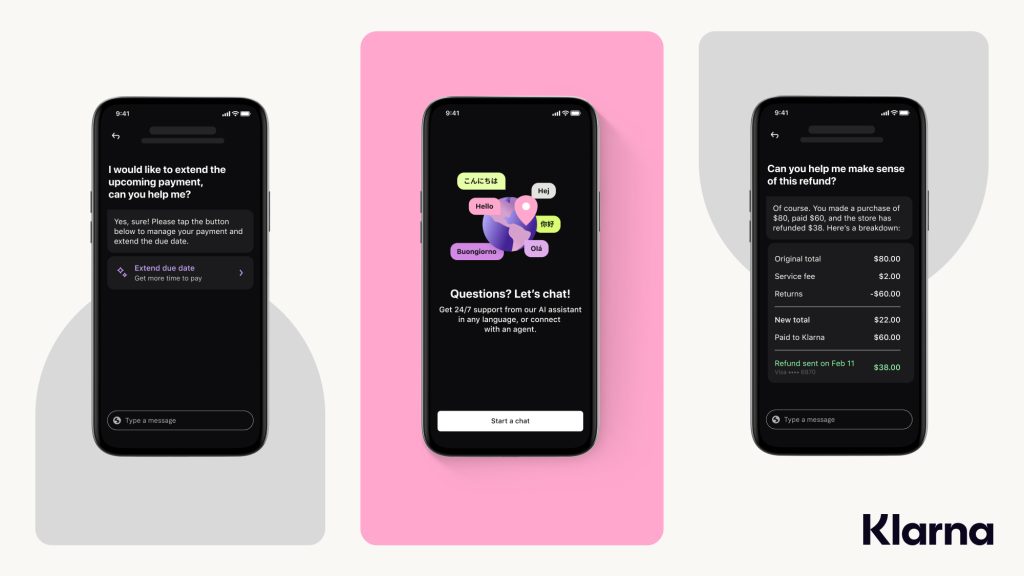
Klarna deployed an AI customer service agent powered by OpenAI, trained on company-specific workflows, policies, and multilingual contexts. The agent could autonomously resolve inquiries, escalate complex cases, and continuously learn from interactions.
Outcome
- 2.3 million support conversations handled in just one month
- Equivalent productivity of 700 full-time agents
- Average resolution time cut from ~11 minutes to under 2 minutes
- Repeat inquiries down 25%
- Projected to drive $40 million in profit improvement by the end of 2024
4.2. Alta – Structured sales automation with specialized AI agents
Like many SaaS startups, Alta faced slow, manual sales operations, prospecting, lead research, outreach, and CRM updates were eating up valuable time. Sales reps were bogged down by repetitive admin tasks, limiting their ability to focus on closing deals.
How AI agents helped
Alta built a suite of purpose-specific AI agents:
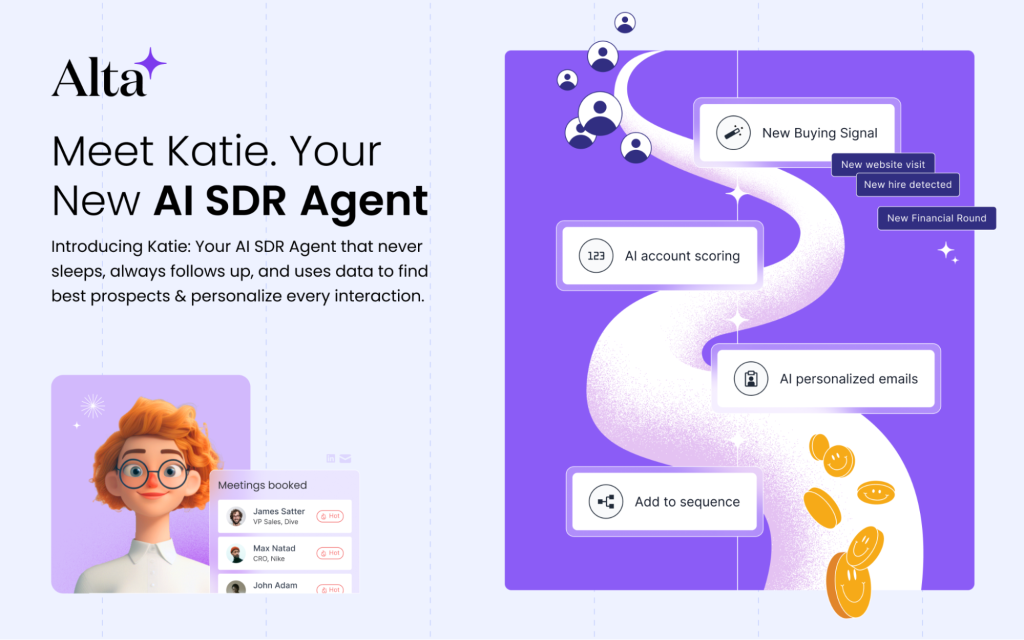
- “Katie” for lead prospecting and enrichment
- “Luna” for revenue ops and sales pipeline optimization
- “Alex” for follow-ups and meeting scheduling
These agents were deeply integrated into Salesforce, HubSpot, Apollo, and internal APIs, enabling end-to-end automation in the sales funnel.
Outcome
- 70% of sales admin tasks are automated
- Reps spent more time on strategic selling and less on data entry
- Enabled faster outbound, better lead response times, and more consistent pipeline velocity
- Significant reduction in CAC (customer acquisition cost) thanks to streamlined operations
5. How startups can get started with AI agents as a service
Your startup doesn’t need a full AI team to start. Here’s how:
- Identify high-friction workflows: Look for repetitive, rule-based, or time-consuming tasks for your team, including support, CRM updates, reporting, and so on.
- Start small and think scalable: Begin with 1-2 staff in areas with a quick ROI, such as lead generating or ticket handling.
- Select the correct platform: To reduce time to value, use platforms such as LangChain and Auto-GPT, or collaborate with an AI agent development service provider.
- Test and Iterate: Run test use cases in a sandbox environment and adjust agents based on performance.
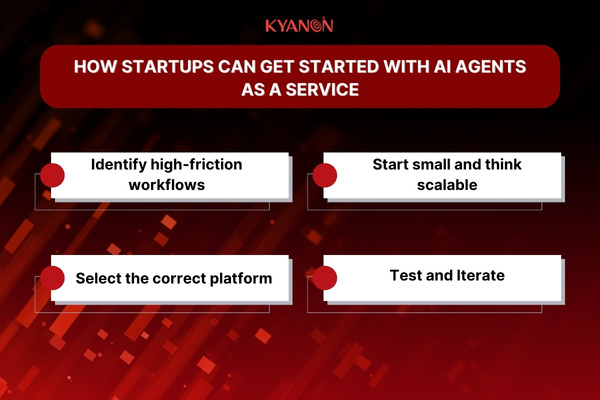
Startup-specific tip: Focus on the problem, not just the tool. A simple employee automating 20% of your workflow can free up 80% of your team’s time.
6. How to choose the right AI agent service provider for startups
Choosing the right AI agent service provider is mission-critical, especially when every dollar, every workflow, and every tech decision directly impacts your startup’s growth and burn rate. Here are five essential criteria to consider:
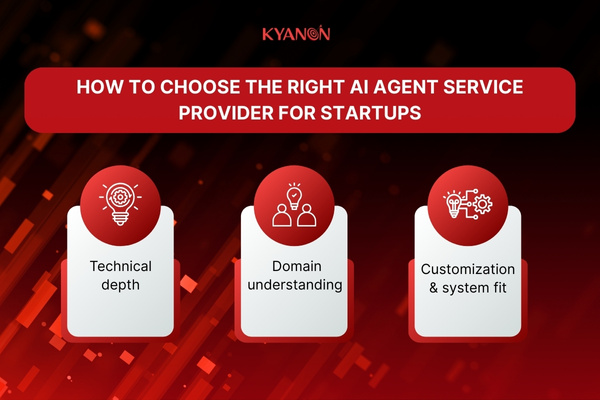
6.1. Technical depth – Beyond just LLMs
Make sure the provider can build full-stack AI agents, including:
- Large Language Models (e.g., GPT-4, Claude, open-source LLMs)
- Vector databases (Weaviate, Pinecone)
- Retrieval-Augmented Generation (RAG) systems
- Planning frameworks like ReAct, Auto-GPT, or LangGraph
- Integration with enterprise tools (Zapier, Make, or custom APIs)
A sales agent shouldn’t just “chat”, they should understand intent, pull CRM history, and update deal stages automatically.
6.2. Domain understanding – Knows your industry inside out
A great provider doesn’t just write great code, they understand how your business works:
| Industry | AI agent use cases | Why it matters |
| SaaS | – Onboarding support
– Demo follow-ups – Ticket classification & triage |
Accelerates customer activation and reduces load on CS teams |
| eCommerce | – Order tracking & updates
– Review management – Personalized upsell/cross-sell suggestions |
Handles volume at scale, especially during peak seasons |
| Fintech | – Compliance checks
– KYC/AML automation – Secure data summarization & routing |
Maintains trust and ensures adherence to regulations with minimal manual overhead |
Table: AI Agents as a Service: Industry Use Cases for Startups
6.3. Customization & system fit – Not a one-size-fits-all tool
An effective AI agent as a service must integrate smoothly with the tools you already use, otherwise, it creates friction instead of value.
- CRM (HubSpot, Salesforce): Auto-update deal stages, personalize follow-ups, and sync lead data—no manual input needed.
- Project Management (Notion, Jira, Slack): Create tasks from conversations, track deadlines, and share summaries instantly.
- BI Tools (Looker, Tableau, Google Sheets): Pull live data, generate reports, and deliver insights to decision-makers in real time.
- Custom APIs & Legacy Systems: Whether it’s a homegrown backend or ERP, your agent should integrate via a secure API without disrupting workflows.
7. Challenges and best practices
| Red flags to avoid | Best practices |
| No clear goals or KPIs for agent deployment | Start with narrow, clearly defined use cases (e.g., lead qualification, ticket triage) |
| Poor integration with existing tools and workflows | Ensure deep integration with your current stack (CRM, ERP, internal APIs) |
| No human-in-the-loop control or failover mechanisms | Build in a human override for complex, sensitive, or high-impact tasks |
| Assuming agents are “set and forget” | Continuously monitor agent performance and collect user feedback |
| Lack of learning, memory, or historical context | Use RAG systems or vector DBs to give agents memory and improve over time |
Table: Common Challenges & Best Practices for AI Agents as a Service
8. Kyanon Digital: Your startup AI agent development partner
As a trusted AI agent service provider, Kyanon Digital specializes in building scalable, production-ready AI agents as a service tailored to startup needs. Whether you’re looking to automate support, streamline operations, or accelerate sales, we help you deploy agents that go beyond chatbots, agents that think, plan, and act.

What makes Kyanon Digital different?
- Human-Centric Design: We design solutions that are intuitive, impactful, and crafted to solve real-world challenges while enhancing user experiences.
- Engineering Excellence: With our Center of Excellence (CoE) driving innovation, we deliver scalable, reliable, and future-ready digital solutions.
- High-performance Agile Teams: Our expert teams seamlessly integrate with yours, combining technical expertise, agile mastery, and transparent collaboration to deliver adaptable, high-impact results.
Conclusion
In today’s high-stakes startup environment, where every dollar must be justified and every process streamlined, AI agents as a service are not a luxury they’re a strategic imperative. They enable startups to automate routine operations, improve team productivity, and drastically reduce burn without sacrificing speed or service quality.
That’s where Kyanon Digital comes in: your trusted AI agent service provider, delivering scalable, human-centric AI solutions built for startup realities.
Ready to scale smarter, not harder? Contact Kyanon Digital to help you build your first AI agent.
References
- AI Startups Burn Through Cash 2x as Fast, and 10 Other Top Learnings from SVB’s Latest in Enterprise, Saastr
- UK’s “Winning Business in the Age of AI” survey: 19 % ROI in 3 months; 27 % in 6–12 months, IT Pro
- Battery OpenCloud Report 2024, Battery Ventures
- Case Studies: How Businesses Are Leveraging AI CRM to Enhance Customer Relationships and Boost Sales in 2025, Superagi
- Case Studies: Using AI Chatbots to Reduce Shopify Store Support Tickets by 50%, Linkedin
- Case Studies: Klarna’s AI Assistant Does the Job of 700 Customer Service Agents, Hubspot

